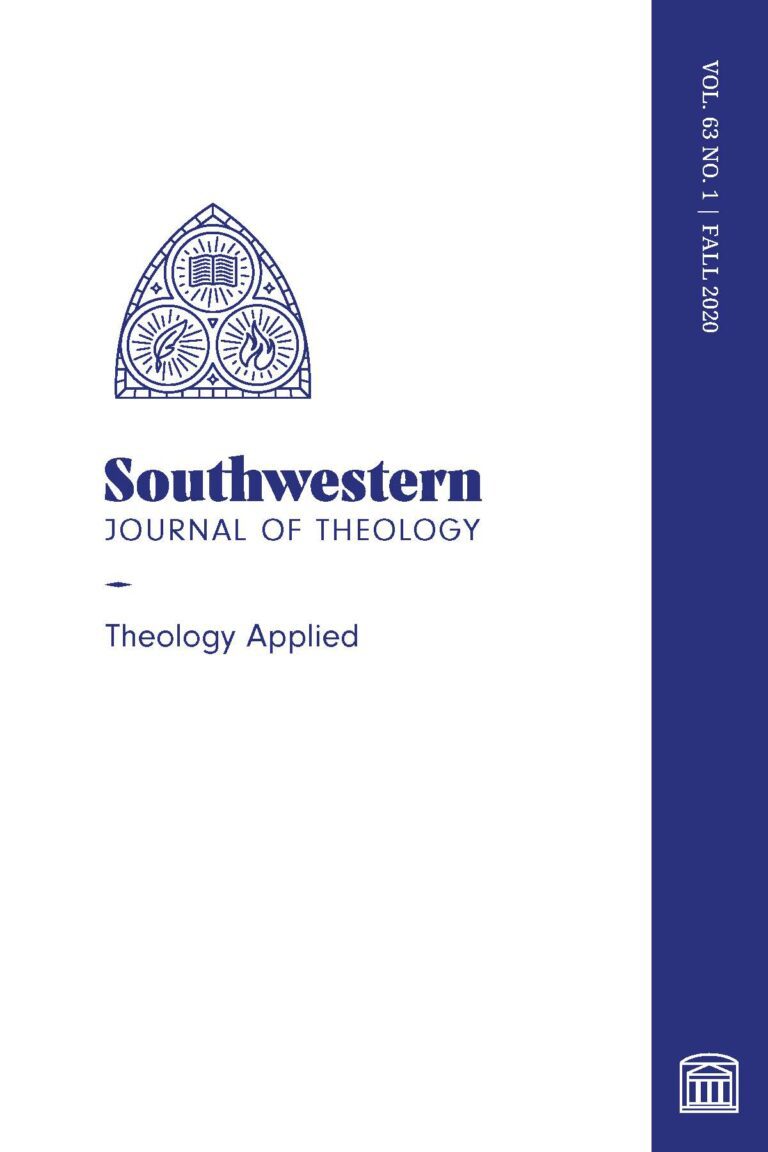
Theology Applied
Southwestern Journal of Theology
Volume 63, No. 1 – Fall 2020
Editor: David S. Dockery
By Robert J. D. Wainwright. Reformed Academic Dissertation. Phillipsburg: P&R, 2020, xvii+416pp., $59.99
While the concept of “covenant” has been fundamental to Reformed theology since the early days of the Reformation, the story of its origins and development has been contested by scholars for generations. In Early Reformation Covenant Theology, Robert Wainwright, a chaplain and fellow at Oriel College, Oxford University, mines the primary sources of both the Swiss and early English Reformers in an effort to reconstruct the story of the rise of covenant theology in the early Reformation (1520s-1550s). The book is an outstanding example of historical theology done well, where readers watch the emergence of a theological concept develop in the context of real-world circumstances without the interference of some predetermined consensus of a later period guiding the storyline.
Wainwright’s book, which is a revision of his Oxford dissertation, has a complex thesis, one that can be divided into three main concerns. First, he argues that we can discern a coherent tradition of covenant theology in three early Swiss theologians: Huldrych Zwingli, Heinrich Bullinger, and John Calvin. While each affirmed justification by faith (solafideism), they generally articulated the concept of covenant in a bilateral manner, meaning that both parties within the covenant are bound by mutual responsibilities: God graciously and freely provides for salvation in Christ to those who believe, and the redeemed are under the reciprocal obligation to keep the covenant by walking with him and keeping his law. This concept of “reciprocal” obligation on behalf of the Christian, Wainwright maintains, is a central feature of Swiss covenant theology, and was responsible for the robust ethical approach to ecclesiastical reform carried out in Zurich and Geneva (pp. 331-32).
A second part of Wainwright’s thesis concerns how Swiss covenant theology took root in England. Wainwright meticulously analyzes the writings of four early English Reformers—William Tyndale, Miles Coverdale, John Hooper, and John Bradford—to demonstrate that they heavily drew upon the covenantal concepts pioneered by their continental counterparts. A complicated picture emerges from these investigations. For Tyndale, Coverdale, and Hooper, Wainwright argues that we see the unmistakable evidence of Swiss covenantal themes appearing in their writings. This is demonstrated by the way these theologians closely coordinated Christian faith (i.e. justification) with moral responsibility (i.e. sanctification) within the context of covenant (p. 220). Hooper, for instance, believed “human works [are] worthless for salvation,” yet he strongly maintained that the redeemed are obliged to keep the divine law and strive for godliness if they are to demonstrate that they are truly covenant children (p. 200).
Interestingly, John Bradford’s theology took a different turn. Following Martin Bucer, the Strasbourg Reformer who rejected the conditionality associated with a bilateral understanding of covenant (p. 221), Bradford prominently featured the theme of divine election in his writings. Wainwright observes that this emphasis essentially prevented Bradford’s thought from becoming overly saturated with covenantal and moral themes. Bradford was deeply concerned with Christian morality, but for him sanctification emerges from the gratitude and awe that arises from an awareness of divine election, not from the conditionality entailed in the bilateral understanding of covenant we find in Swiss theology (pp. 213-16). Bradford’s theology reveals that different approaches to Reformed thought were present in these early years of the English Reformation.
In the third part of his thesis, Wainwright devotes two chapters to the sacramental theology of the Swiss and English Reformers. There he notes how Swiss covenantal themes appear in the sacramental writings of the early English Reformers, a point which further demonstrates how a specifically Swiss formulation of covenant was central to the systematic development of Reformed thought in England. “Where Swiss concepts of covenant were adopted by Englishmen,” Wainwright observes, “their sacramental theologies evidence this reception” (p. 329).
One of the great values of the book is the way it restructures our understanding of how covenant theology emerged in the English Reformed tradition. While it is true that Luther’s solafideism was prominent among English Protestants during the 1520s, Wainwright notes how there was an identifiable pivot toward Swiss views after 1530, especially by Tyndale, Coverdale, and Hooper. Furthermore, Wainwright suggests that this early English approach to the covenant is a coherent tradition in the history of covenant theology—a school if you will—one which must be distinguished from the later federal theology of the Puritan tradition (pp. 347-48). The Puritans were moral precisianists who extensively elaborated the way the law of Christ is to guide every aspect of Christian behavior and national life. By contrast, the early English Reformed highlighted in this book were not as “precise” in their application of the bilateral covenant (p. 348). They were, Wainwright suggests in the title of his final chapter, “imprecisely Reformed.”
Early Reformation Covenant Theology is an outstanding example of a study in historical theology. Wainwright is thoroughly immersed in the primary and secondary sources, and he successfully draws readers into the nexus of two intellectual worlds: the Swiss and English Reformers. The vast apparatus of footnotes throughout its pages constantly reminds readers that the book is a dissertation, a work of meticulous scholarship aimed at a highly-trained academic audience. Yet this observation should not dissuade non-specialists from reading it. Wainwright’s clear writing renders the study accessible to laypersons who are fascinated with covenant theology and the Reformation, and who want to take the effort to work through this rich and rewarding study. I highly recommend it!





